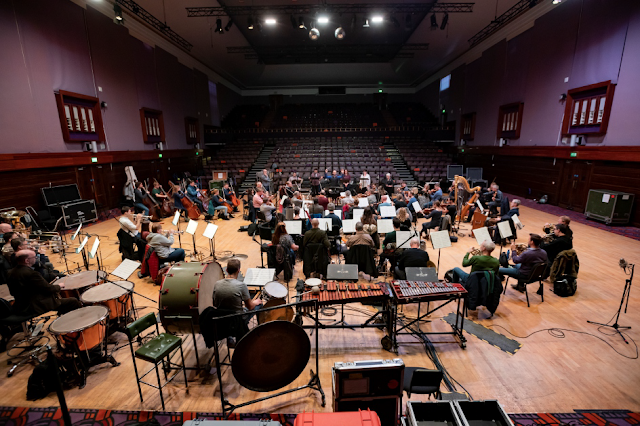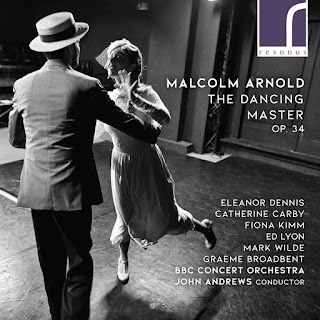Malcolm Arnold The Dancing Master; Eleanor Dennis, Catherine Carby, Fiona Kimm, Ed Lyon, Mark Wilde, Graeme Broadbent, BBC Concert Orchestra, John Andrews; Resonus
Reviewed by Robert Hugill on 23 OCtober 2020 Star rating: (★★★★)
Malcolm Arnold's first opera makes it onto disc for the first time, and proves to be an engaging Restoration romp
I first came across Malcolm Arnold's 1952 opera, The Dancing Master, in 2015 when it was performed as part of a double bill at the Guildhall School of Music and Drama [see my review]. The work is not entirely a lost masterpiece, it has popped up, but only in occasional performances and the work has never managed to make it onto the national stage. Now, we have a studio recording of Malcolm Arnold's The Dancing Master from Resonus Classics, with John Andrews conducting the BBC Concert Orchestra with Eleanor Dennis, Catherine Carby, Fiona Kimm, Ed Lyon, Mark Wilde and Graeme Broadbent.
Not only is Malcolm Arnold not well known for his operas, he does not seem to have written very much vocal music at all. There are around ten vocal and choral works, as opposed to the remarkable number orchestral and chamber pieces he wrote, not to mention the film scores (some of which, presumably, include vocal items). The Dancing Master is in fact Arnold's longest opera, his only other one being The Open Window, a 20-minute work from 1956.
He had had ideas for operas with the film-maker Joe Mendoza which did not come to fruition. Then Mendoza got in touch about the idea of doing an opera based on an adaptation of a Restoration comedy, for a television broadcast by the BBC. Mendoza already had a script adaptation of Wycherley's The Gentleman Dancing Master for a film which was never made. Something seems to have appealed to Arnold. And when Mendoza sent him a prototype libretto for comments, Arnold responded two weeks later with the full score. And this despite being inordinately busy and productive.
The BBC was distinctly sniffy about the opera, with comments about the unsuitability of the piece for a family audience (this was 1952 after all). It never did get a stage production either, and seems to have been just shunted to the side. During Arnold's lifetime there was an amateur performance with piano, and shortly before his death a concert performance with the BBC National Orchestra of Wales conducted by James Holmes. It had a semi-staged performance at the 2012 Malcolm Arnold Festival and its first full staging was the 2015 Guildhall School performance.
The story is the usual craziness, an absent father, a termagant aunt who has the heroine and her maid locked in the house for a year to protect the girl's virtue, an ineffectual betrothed and a gallant rake who sweeps off the heroine. One of the odd things is that none of the men are quite what they seem, the father Diego (Graeme Broadbent) has spent so long in Spain (15 years we gather) that he has acquired Spanish habits and is convinced he is a Spaniard. The betrothed, Monsieur (Mark Wilde) is English but has had a French education and is now more French than the French. The gallant rake, Gerard (Ed Lyon) has to pretend to be a dancing master to access the heroine Miranda (Eleanor Dennis). He is terrible at the pretence, and Miranda does not trust him. It is only when Gerard is really himself (he writes poetry!), that he wins her and wins the day.
The music is engaging and tuneful. There are set pieces, but much of it runs along in arioso-like dialogue and there is plenty of text. You feel that, perhaps, it might have been a better opera if Arnold and Mendoza had worked on it together rather than Arnold simply setting the first text he was given. One of the fascinations of his style is that he does not really write recitative, the orchestra burbles along all the time full of imaginative material; sometimes the motifs in the orchestra are more memorable than the vocal lines. When I heard the work live, sung by students, it felt vastly over-scored and the chatty dialogue just did not come over the busy orchestration. It is written for an orchestra with double woodwind, four horns, three trumpets, three trombones, tuba, harp, celeste and percussion, and Arnold uses everything.
Listening to the disc, it still feels oddly over-scored, Sir Arthur Sullivan it is not, and you wish Arnold had had a chance to hear it and revise it. But John Andrews does a fine job of keeping the orchestra down and allowing the singers (and the words) to come forward, though I did wonder how much of this was due to knob twiddling by the production team. Perhaps, however, that is the solution and that the piece does make an ideal recording opera.
It is clear from the outset that the cast are having great fun. Eleanor Dennis makes a strong Miranda, a girl who clearly knows her mind and who you suspect will run rings round her rake of a husband (reformed or not). She is a complete delight, nary a simper and instead plenty of character and gumption. Ed Lyon makes an ardent suitor, convincing us that he fell in love when he saw her and Lyon's voice has enough welly for the moments when Gerard is called upon to soar romantically over the busy textures, and soar Lyon does. He and Dennis make a wonderfully matched pair.
As Miranda's official suitor, Monsieur, Mark Wilde clearly had a whale of a time pretending to be French and also being the prime silly ass of the plot. Fiona Kimm makes the most of Mrs Caution the wonderfully termagant aunt, and each of Kimm's phrases comes out finely trenchant. Catherine Carby is great fun as the lively maid, Prue, though in a recording of an unknown work, Carby's voice is at times to close to Dennis' for ease of distinguishing character.
It is never clear from the plot whether Miranda's father Diego (Graeme Broadbent) is cunning, and connived at Gerard and Miranda's ruse, or whether he simply says he did to save face. Whatever, Broadbent is delightfully full of himself as Diego, with a superbly dark voice to match the character's po-faced view of himself. The result, in all its seriousness, is of course funny.
 |
| Arnold: The Dancing Master - recording session at Watford Colosseum (Photo Resonus Classics) |
I enjoyed the opera, though it feels a bit headlong at times and does not pause for breath. And it is certainly not an easy sing, the sheer busyness of vocal lines and orchestra ensure this and things culminate in a complex sextet. But, Andrews and his cast breath real life into the opera and make it all sound easy, and the orchestra bubbles away delightfully so that each time I listened to it there were new little (and not so little) details that I came across. I would still like to see a stage production that really worked, but this disc is certainly an engaging introduction to an opera which deserves to be more than just a curiosity.
Malcolm Arnold (1921-2006) - The Dancing Master (1952) [75:40]
Miranda - Eleanor Dennis (soprano)
Prue - Catherine Carby (mezzo-soprano)
Mrs Caution - Fiona Kimm (contralto)
Gerard - Ed Lyon (tenor)
Monsieur - Mark Wilde (tenor)
Diego - Graeme Broadbent (bass-baritone)
BBC Concert Orchestra
John Andrews (conductor)
Recorded at Watford Colosseum, 7-9 January 2020
RESONUS RES10269 1CD [75.40]
Available from Amazon, and from Hive.co.uk.
- An honourable failure or a misunderstood masterpiece? Another look at Weber's Oberon - feature article
- Weber at home: Complete keyboard duets from Julian Perkins and Emma Abbate - Cd review
- Everything via Association: composer Vic Hoyland on his 75th birthday - interview
- Welcome to the high energy world of Irish composer Ed Bennett: Psychedelia from NMC - CD review
- From the whole earth dancing to a day in hell: chamber music by Cheryl Frances-Hoad - CD review
- The case against Wagner - David Faiman's Meyerbeer: The deliberately forgotten composer - book review
- Mendelssohn Cello Sonatas and more: historically informed performances from cellist Viola de Hoog and pianist Mikayel Balyan - CD review
- Beethoven and Black muses: Gweneth Ann Rand, Simon Lepper, Stephan Loges, Eugene Asti at the Oxford Lieder Festival - concert review
- The BBC Symphony Orchestra at 90: in advance of the orchestra's celebratory concert, Tony looks at its distinguished history - feature
- Six Songs of Melmoth: premiere of Cheryl Frances-Hoad's new song-cycle at Oxford Lieder Festival - concert review
- A song is a song is a song: composer Errollyn Wallen on her multi-faceted career and her forthcoming EP with King's College Choir - interview
- Home












No comments:
Post a Comment